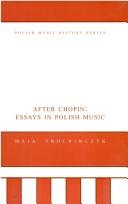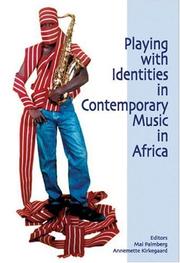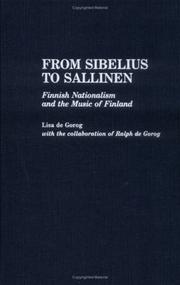| Listing 1 - 10 of 69 | << page >> |
Sort by
|
Book
ISBN: 9781138287426 1138287423 9781315268279 Year: 2018 Publisher: London : Routledge,
Abstract | Keywords | Export | Availability | Bookmark
 Loading...
Loading...Choose an application
- Reference Manager
- EndNote
- RefWorks (Direct export to RefWorks)

ISBN: 0916545059 Year: 2000 Publisher: Los Angeles Polish Music Center University of Southern California
Abstract | Keywords | Export | Availability | Bookmark
 Loading...
Loading...Choose an application
- Reference Manager
- EndNote
- RefWorks (Direct export to RefWorks)
Book
ISBN: 1498581633 Year: 2018 Publisher: Lexington Books
Abstract | Keywords | Export | Availability | Bookmark
 Loading...
Loading...Choose an application
- Reference Manager
- EndNote
- RefWorks (Direct export to RefWorks)
Taking as a thread the concept of national identity, this book elucidates the sound transformations that have taken place in the world of the Latin American art song since its appearance in the late nineteenth century to the present day. The book focuses in the art songs of Brazil, Argentina, Cuba, Venezuela, Bolivia, Peru, and Colombia. The book addresses the subject of performance practice of the Latin American song and ends with a proposal for its interpretation. In songs, spaces of representation and cathartic tools thought, language and music have been at the service of some interests, fulfilling specific functions in the construction of the nation. In them, we observe that the construction of identity is a continuous, constant and changing process in which different stories are superimposed. Seen this way, songs are historical texts where social interactions are reflected, and the past, the present and the future are constantly negotiated. The book also addresses the subject of performance practice of the Latin American song and ends with a proposal for its interpretation.
Songs --- Nationalism in music. --- History and criticism. --- Nationalism in music

ISBN: 9171064966 Year: 2002 Publisher: Uppsala Nordiska Afrikainstitutet
Abstract | Keywords | Export | Availability | Bookmark
 Loading...
Loading...Choose an application
- Reference Manager
- EndNote
- RefWorks (Direct export to RefWorks)

ISBN: 0313267405 Year: 1989 Publisher: New York Westport (Connecticut) London Greenwood Press
Abstract | Keywords | Export | Availability | Bookmark
 Loading...
Loading...Choose an application
- Reference Manager
- EndNote
- RefWorks (Direct export to RefWorks)
Book
ISBN: 9781138630543 1138630543 9780367640163 0367640163 Year: 2021 Publisher: London : Routledge,
Abstract | Keywords | Export | Availability | Bookmark
 Loading...
Loading...Choose an application
- Reference Manager
- EndNote
- RefWorks (Direct export to RefWorks)
Medievalism, or the reception or interpretation of the Middle Ages, was a prominent aesthetic for German opera composers in the first half of the nineteenth century. A healthy competition to establish a Germanic operatic repertory arose at this time, and fascination with medieval times served a critical role in shaping the desire for a unified national and cultural identity. Using operas by Weber, Schubert, Marshner, Wagner, and Schumann as case studies, Richardson investigates what historical information was available to German composers in their recreations of medieval music, and whether or not such information had any demonstrable effect on their compositions. The significant role that nationalism played in the choice of medieval subject matter for opera is also examined, along with how audiences and critics responded to the medieval milieu of these works. In this book, readers will gain a clear understanding of the rise of German opera in the early nineteenth century and the cultural and historical context in which this occurred. This book will also provide insight on the reception of medieval history and medieval music in nineteenth-century Germany, and will demonstrate how medievalism and nationalism were mutually reinforcing phenomena at this time and place in history.
Opera --- Medievalism in art. --- Nationalism in music. --- Opéras allemands
Book
ISBN: 9783631672310 Year: 2017 Publisher: Frankfurt am Main ; New York, NY : PL Academic Research,
Abstract | Keywords | Export | Availability | Bookmark
 Loading...
Loading...Choose an application
- Reference Manager
- EndNote
- RefWorks (Direct export to RefWorks)
This book focuses on the relationship between identity and music in Europe from different angles. It takes two basic categories into account : identities in music and music in identities. The authors provide studies on identity construction in different historical and geographical contexts. They also evaluate the discourse of popular music in Europe and analyze various topics related to complex and changing concepts of identity, whether it is about an individual composer, issues of style or musical work itself
Music --- Music --- Nationalism in music. --- Music --- Social aspects --- Political aspects
Book
ISBN: 1501348205 1501348191 9781501348198 9781501348181 1501348183 Year: 2019 Publisher: New York, NY
Abstract | Keywords | Export | Availability | Bookmark
 Loading...
Loading...Choose an application
- Reference Manager
- EndNote
- RefWorks (Direct export to RefWorks)
Music --- Modernism (Music) --- Nationalism in music. --- History and criticism.
Book
ISBN: 3031416449 Year: 2024 Publisher: Cham : Springer International Publishing AG,
Abstract | Keywords | Export | Availability | Bookmark
 Loading...
Loading...Choose an application
- Reference Manager
- EndNote
- RefWorks (Direct export to RefWorks)
Nationalism in music --- National songs --- History. --- History and criticism.
Book
ISBN: 0801492831 0801416469 Year: 1984 Publisher: Ithaca (N.Y.) : Cornell university press,
Abstract | Keywords | Export | Availability | Bookmark
 Loading...
Loading...Choose an application
- Reference Manager
- EndNote
- RefWorks (Direct export to RefWorks)
Music --- Social aspects. --- Wagner, Richard, --- Influence. --- Nationalism in music --- Political aspects.
| Listing 1 - 10 of 69 | << page >> |
Sort by
|

 Search
Search Feedback
Feedback About UniCat
About UniCat  Help
Help News
News